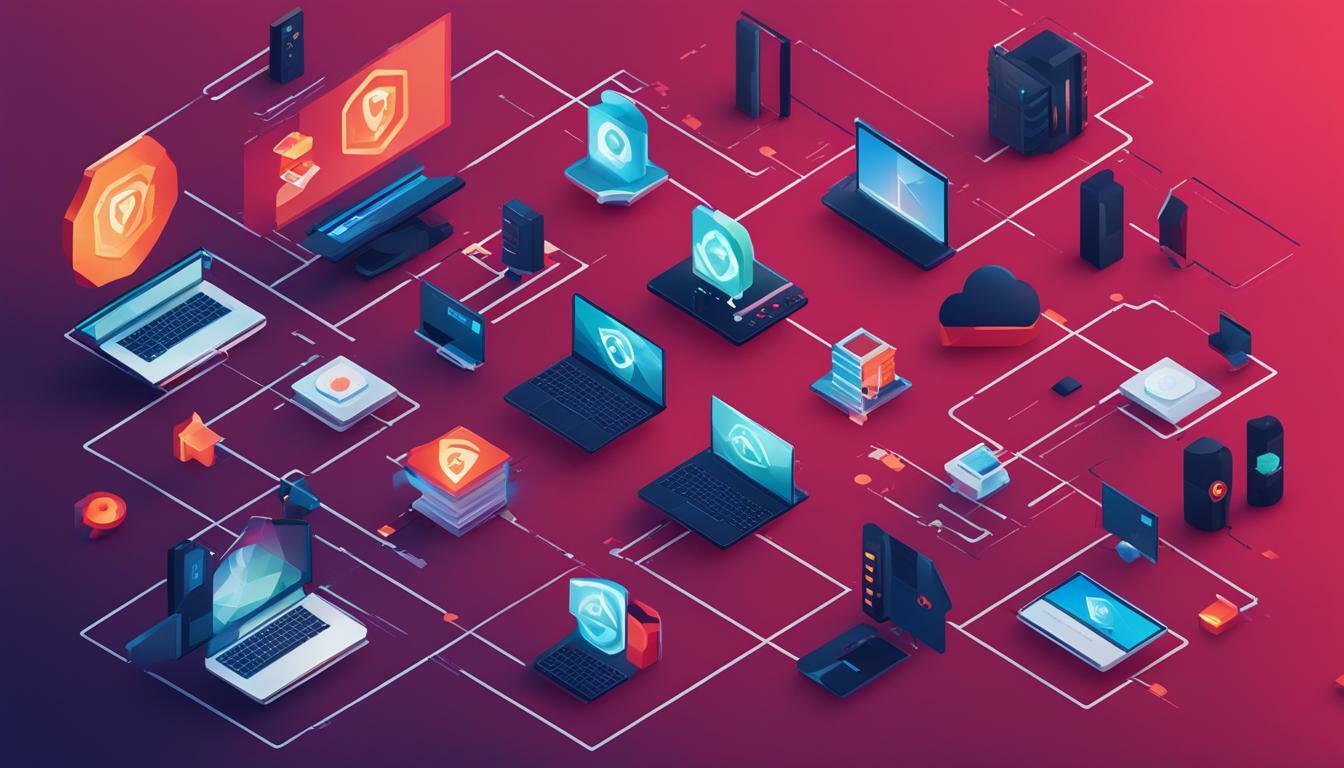The use of VPNs and proxies has become increasingly popular as individuals seek to protect their online privacy and security. Both VPNs and proxies serve a similar purpose of hiding your IP address and rerouting your internet traffic through remote servers. However, there are important differences between them that determine their functionality and level of security.
A proxy server acts as an intermediary between the website you’re visiting and your device. It allows you to access specific apps or services anonymously. In contrast, a VPN works at the operating system level, redirecting all your internet traffic through a secure connection. This encryption ensures that all your data remains private and secure from prying eyes.
While both VPNs and proxies can hide your IP address, VPNs offer a higher level of security and privacy. Proxy servers only work with specific apps or services, while VPNs secure all your internet traffic, offering comprehensive protection. VPNs also encrypt your data, making it virtually impossible for anyone to intercept or decipher it.
Another important distinction is coverage and access. Proxy servers may have limited coverage, only routing traffic for specific apps or services. On the other hand, VPNs provide broader coverage, securing all your online activities, regardless of the app or website you’re using.
- A VPN and a proxy both hide your IP address and reroute your internet traffic through remote servers.
- A proxy server works with specific apps or services, while a VPN secures all your internet traffic and provides comprehensive protection.
- VPNs offer encryption to safeguard your data, while proxy servers do not.
- VPNs provide broader coverage, securing all your online activities, whereas proxy servers may have limited coverage.
- VPNs are usually paid services with a no-log policy, while many proxy servers are free but may monitor your traffic.
Understanding VPNs and Proxies
Before diving into the question at hand, it’s important to understand the fundamental differences between a VPN and a proxy. Both are online services that hide your IP address by rerouting your internet traffic through a remote server. However, their mechanisms and capabilities vary significantly, ultimately affecting the level of privacy and security they provide.
“A proxy works only with a single app or service, while a VPN secures all your internet traffic and encrypts it for extra security and privacy.”
In simple terms, a proxy server acts as a relay between the website you’re visiting and your device. It works on a per-application basis, meaning only the specific app or service configured to use the proxy will benefit from its functionality. While this can be helpful in certain situations, such as accessing region-restricted content, it leaves other aspects of your online activity exposed.
On the other hand, a VPN, or Virtual Private Network, operates on the operating system level, redirecting all your internet traffic through its servers. This means that no matter which app or service you’re using, all your data is encrypted and securely transmitted. VPNs provide a higher level of privacy and security compared to proxies.
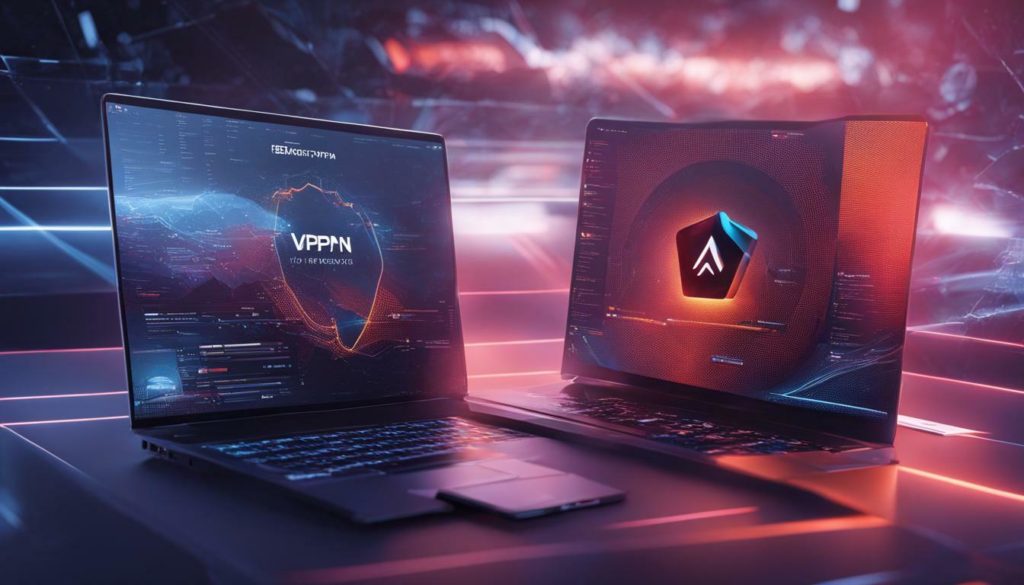
One key distinction between VPNs and proxies lies in their encryption capabilities. VPNs encrypt your data, making it unreadable to external parties like hackers or internet service providers. Proxies, on the other hand, do not encrypt your data, leaving it vulnerable to interception.
“VPNs offer more coverage, are usually paid, and often have a no-log policy, while many proxy servers are free but may monitor traffic.”
Another important factor to consider when choosing between a VPN and a proxy is coverage. VPNs typically have a vast network of servers spread across different locations, granting you access to a wider range of websites and services from anywhere in the world. In contrast, proxies may have limited coverage and may not support all websites or apps.
Additionally, VPN services are usually paid, providing a higher level of reliability and support. Many reputable VPN providers also follow a strict no-log policy, ensuring that your online activities are not recorded or monitored. On the other hand, while some proxy servers are free, they may come with certain limitations and can potentially collect and sell your data for advertising purposes.
“If you want to hide your IP address, either a VPN or a proxy server will work, but a VPN provides greater privacy and security.”
In conclusion, if your primary goal is to hide your IP address and bypass geo-restrictions, both a VPN and a proxy server can serve your purpose. However, if privacy and security are your top concerns, a VPN is the recommended choice. With encryption, broader coverage, and enhanced privacy features, VPNs offer a more robust solution for protecting your online identity and data. It’s important to assess your specific needs and choose the option that aligns with your priorities.
Summary:
- VPNs and proxies are online services that hide your IP address by rerouting your internet traffic through remote servers.
- A proxy works with a single app or service, while a VPN secures all your internet traffic and encrypts it for extra security and privacy.
- Proxies act as intermediaries between the website you’re visiting and your device, while VPNs work on the operating system level and redirect all your traffic.
- VPNs encrypt your data, while proxy servers do not provide encryption.
- VPNs offer more coverage, are usually paid, and often have a no-log policy, while many proxy servers are free but may monitor traffic.
- If you want to hide your IP address, either a VPN or a proxy server will work, but a VPN provides greater privacy and security.
How Proxies Work
When using a proxy server, your internet traffic is rerouted through a remote server before reaching the desired website or online service. Essentially, a proxy acts as an intermediary between your device and the website you’re visiting. It receives your requests and forwards them on your behalf, masking your IP address in the process.
A proxy server can be configured at the app or system level, depending on your preferences. By redirecting your traffic through a remote server, proxies can help you bypass geographical restrictions and access content that may be blocked in your region. However, it’s important to note that proxy servers typically only work with a single app or service at a time. This means that if you’re using a proxy to access a specific website, your other internet traffic won’t be affected.
While proxies are useful for accessing blocked content or hiding your IP address, they do have limitations. Unlike VPNs, proxies don’t encrypt your data, leaving it potentially vulnerable to interception. Additionally, many free proxies may monitor and log your internet activity, compromising your privacy. If you need both privacy and security, a VPN is a better option.
Proxy vs VPN:
Here’s a quick comparison between proxies and VPNs:
| Proxy | VPN |
|---|---|
| Reroutes traffic for a single app or service | Reroutes all internet traffic at the operating system level |
| Doesn’t encrypt data | Encrypts data for enhanced security |
| May log and monitor internet activity | Often have a no-log policy for increased privacy |
| Free options available | Usually paid services |
| Limited coverage | Offers broader coverage and access |
Ultimately, whether you choose to use a proxy or a VPN depends on your specific needs. If you simply want to access blocked content or hide your IP address temporarily, a proxy server can suffice. However, if you value privacy, security, and want comprehensive coverage for all your online activities, a VPN is the better choice.
To visualize the concept of how a proxy server works, imagine sending a letter to your friend through a third party. Instead of sending the letter directly, you give it to the third party who then sends it on your behalf. The recipient only sees the third party’s return address, not yours. Similarly, a proxy server acts as a middleman between you and the website you’re visiting, ensuring your identity remains hidden.
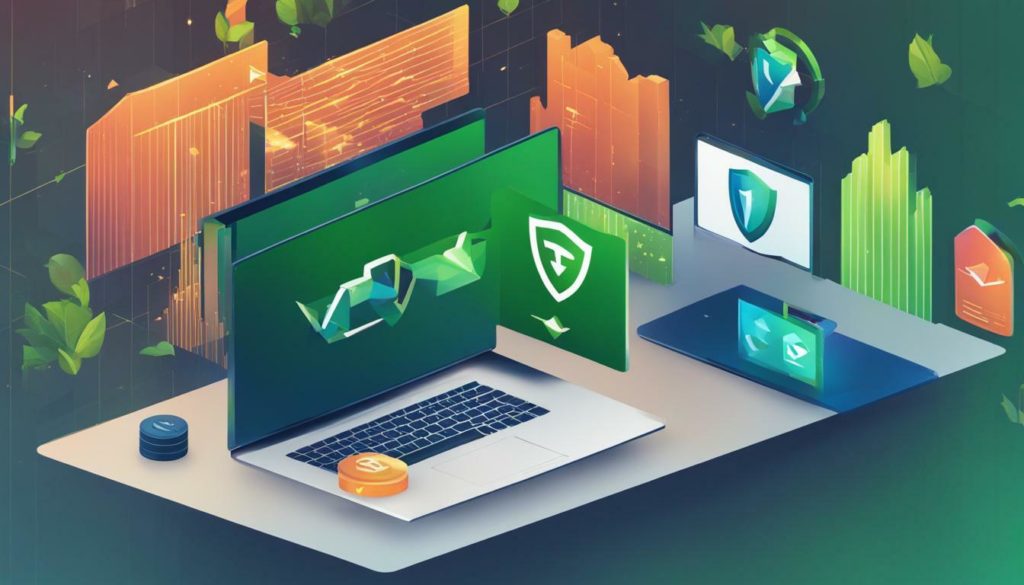
“Using a proxy can help bypass geographical restrictions and access blocked content. However, it’s important to remember that proxies typically offer limited security and privacy features. If you want stronger encryption and comprehensive protection for all your internet traffic, a VPN is the way to go.”
The Basics of VPNs
Unlike proxies, VPNs work at the operating system level, allowing all internet traffic to be securely redirected through a remote server. This means that when you connect to a VPN, all of your online activities, including web browsing, messaging, and file sharing, are encrypted and routed through the VPN server. This provides an extra layer of security and privacy, ensuring that your data is protected from hackers, government surveillance, and other unauthorized access.
VPNs offer several advantages over proxies. Firstly, they encrypt your data, making it unreadable to anyone who may intercept it. This is especially important when connecting to public Wi-Fi networks, as these are often vulnerable to attacks. Additionally, VPNs provide more coverage compared to proxies. While proxies typically only redirect the traffic of specific apps or services, VPNs secure your entire internet connection, protecting all of your online activities.
In terms of server infrastructure, VPN providers have a wide network of servers located in various countries around the world. This allows you to bypass geographical restrictions and access content that may be blocked in your location. Proxies, on the other hand, usually have fewer server options and are more limited in terms of global coverage.
It’s also worth noting that while some proxy servers are free, they may come with limitations and potential risks. Free proxies often have slower speeds, data caps, and may collect and sell your data. VPNs, on the other hand, are usually paid services that offer faster speeds, unlimited data, and often have a no-log policy, meaning they don’t keep records of your online activities.
| VPN | Proxy |
|---|---|
| Works at the operating system level | Works with specific apps or services |
| Encrypts all internet traffic | Does not encrypt data |
| Provides global coverage | May have limited server options |
| Usually a paid service with no-log policy | Some options are free but may collect and sell data |
Ultimately, both VPNs and proxy servers can help hide your IP address, but if you prioritize privacy and security, a VPN is the better option. With its encryption capabilities, wider coverage, and stronger privacy features, a VPN ensures that your online activities remain private and protected.

One of the key advantages of using a VPN is the encryption of your data, which adds an extra layer of security. When you connect to a VPN server, all your internet traffic is encrypted, making it virtually impossible for anyone to intercept and decipher your data.
This encryption process involves scrambling your data into a format that only the VPN server and your device can understand. It functions like a secure tunnel, ensuring that your online activities and personal information remain private and protected from prying eyes.
On the other hand, proxy servers do not offer the same level of encryption. While they can hide your IP address and change your location, they do not encrypt the data you transmit. This means that your online activities, including sensitive information such as passwords or credit card details, can be vulnerable to interception.
| Feature | VPN | Proxy Server |
|---|---|---|
| Encryption | Yes | No |
| Secure Tunnel | Yes | No |
| Data Privacy | High | Low |
Using a VPN is like wrapping your online activities in a secure bubble. It ensures that your data is safeguarded from hackers, government surveillance, and other prying eyes. With a proxy server, your data is vulnerable and susceptible to interception.
Importance of Encryption
Online security threats are increasingly prevalent, and protecting your personal information is of paramount importance. Whether you’re accessing sensitive data, conducting financial transactions, or simply browsing the web, having your data encrypted by a VPN ensures that your information remains secure and your privacy is maintained.
By choosing a VPN over a proxy server, you can enjoy peace of mind knowing that your data is protected by robust encryption technology, preventing unauthorized access and potential data breaches.
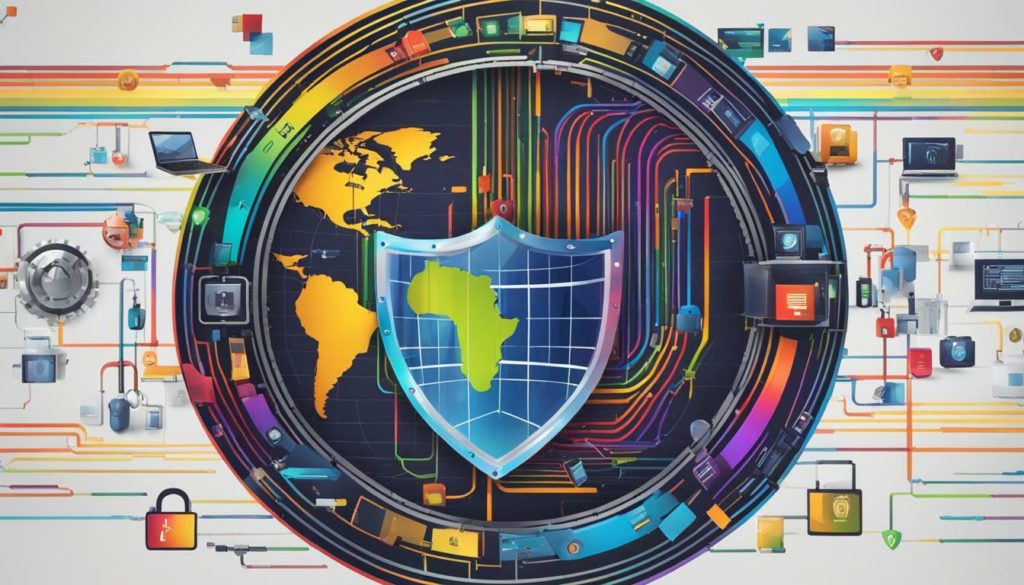
Overall, when it comes to ensuring the security and privacy of your online activities, using a VPN is the superior choice. Its encryption capabilities provide an additional layer of protection that proxy servers do not offer. While both options can hide your IP address, a VPN goes beyond that by encrypting your data and safeguarding your sensitive information.
If you want to enhance your online security and maintain your privacy, a VPN is the ideal solution. Its comprehensive encryption and secure tunneling capabilities make it a valuable tool in today’s digital landscape.
Coverage and Access
While proxies typically operate on a single app or service, VPNs secure all internet traffic, offering more comprehensive coverage. A proxy server acts as an intermediary between your device and the website you’re visiting, allowing you to bypass certain restrictions and access blocked content. However, its functionality is limited to a specific app or service, such as a web browser or a torrent client.
On the other hand, a VPN works on the operating system level, redirecting all your internet traffic through a secure and encrypted connection. This means that not only your web browsing activity but also your emails, messaging apps, and even online gaming are protected. VPNs offer a wider range of coverage, ensuring that all your online activities are shielded from prying eyes.
With a VPN, you can also enjoy unrestricted access to websites and services that may be blocked in your region. By connecting to a VPN server in a different country, you can bypass geographical restrictions and access content that would otherwise be unavailable. Whether you’re traveling abroad and want to watch your favorite shows or simply want to browse the web without limitations, a VPN provides you with the freedom to access the internet on your terms.

| Feature | Proxy | VPN |
|---|---|---|
| Coverage | Limited to a specific app or service | Secures all internet traffic |
| Access | Bypasses restrictions for specific websites or services | Unblocks websites and services globally |
In conclusion, if you’re looking for a solution to hide your IP address and access blocked content, both a VPN and a proxy server can serve that purpose. However, a VPN offers more comprehensive coverage by securing all your internet traffic and providing enhanced privacy and security. With a VPN, you can enjoy unrestricted access to websites and services globally, ensuring a truly borderless online experience.
Paid vs Free Services
VPNs are usually paid services that often come with a no-log policy, while many proxy servers are free but may monitor user traffic. When considering whether to choose a paid VPN or a free proxy server, it’s important to weigh the benefits and limitations of each option.
A paid VPN service typically offers a higher level of security and privacy. With a no-log policy, your online activities are not recorded or stored, ensuring that your internet browsing remains private. Additionally, VPNs encrypt your data, adding an extra layer of protection to your online communications.
On the other hand, free proxy servers may not provide the same level of security or privacy. Since they are often offered as free services, these proxies may monitor and track user traffic to gather information for targeted advertisements or other purposes. It’s essential to carefully read the terms and conditions of any free proxy service to understand how your data is being used.

Ultimately, the choice between a paid VPN or a free proxy server depends on your specific needs and priorities. If you prioritize privacy and security, a paid VPN service is recommended. However, if you are simply looking to hide your IP address and access geo-restricted content, a free proxy server could be sufficient.
| Features | VPNs | Proxy Servers |
|---|---|---|
| Security | High | Variable (depends on the provider) |
| Privacy | High | Variable (depends on the provider) |
| Encryption | Yes | No |
| Coverage | Global | Variable (depends on the provider) |
| Cost | Paid | Free |
| No-Log Policy | Often offered | Depends on the provider |
Privacy and Anonymity
If your goal is to hide your IP address, both a VPN and a proxy server can achieve this, but a VPN offers greater privacy and security. While a proxy server acts as a relay between the website you’re visiting and your device, a VPN works on the operating system level, redirecting all your traffic. This means that with a VPN, all your internet activity is encrypted, making it much more difficult for anyone to intercept or monitor your data.
When using a proxy server, your IP address is masked only for the specific app or service you’re using. This can be useful if you want to access region-restricted content or bypass network restrictions, but it doesn’t provide the same level of protection for other online activities. On the other hand, a VPN encrypts all your internet traffic, ensuring that your data remains secure and private no matter which apps or services you’re using.
Another important factor to consider is the level of coverage offered by VPNs and proxy servers. VPNs generally have more server locations worldwide, allowing you to choose from a wider range of IP addresses. This can be particularly beneficial if you frequently travel or need to access content from different regions. Proxy servers, on the other hand, are more limited in their coverage and may not offer as many options.
| VPN | Proxy Server |
|---|---|
| Encrypts all internet traffic | Encrypts traffic for specific apps or services |
| Offers more server locations worldwide | Provides limited server coverage |
| Generally paid services with no-log policies | Many free options that may monitor traffic |
| Provides greater privacy and security | Offers limited privacy and security |
It’s important to note that if you value your online privacy and security, a VPN is the recommended choice. While both a VPN and a proxy server can hide your IP address, a VPN offers a more comprehensive solution with enhanced encryption, wider server coverage, and better privacy policies. Therefore, using a VPN alone is sufficient, and there is no need to also use a proxy server.
Important Takeaways:
- A VPN and a proxy server can both hide your IP address, but a VPN offers greater privacy and security.
- A VPN encrypts all your internet traffic, while a proxy server only encrypts traffic for specific apps or services.
- VPNs generally have more server locations worldwide, providing better coverage for accessing region-restricted content.
- Proxy servers often have free options, but they may monitor your traffic, while VPNs are usually paid services with no-log policies.
- For maximum privacy and security, it is recommended to use a VPN instead of a proxy server.

While VPNs and proxies serve similar functions, using both simultaneously is redundant, as VPNs fulfill the same purpose and offer more comprehensive features. A VPN, or Virtual Private Network, is a secure connection that encrypts all your internet traffic and routes it through a remote server, effectively hiding your IP address and protecting your online activities.
On the other hand, a proxy server acts as an intermediary between your device and the websites you visit. It reroutes your traffic through its own server, masking your IP address and allowing you to access restricted content. However, unlike VPNs, proxies only work at the app or service level, meaning they are limited in scope and don’t provide system-wide protection.
One of the key differences between a VPN and a proxy is the level of encryption and security they offer. VPNs encrypt all your data, making it virtually impossible for third parties to intercept and decode your online activities. Proxy servers, on the other hand, do not provide encryption and leave your data vulnerable to eavesdropping and interception.

In terms of coverage and access, VPNs are generally more comprehensive. They redirect all your internet traffic, allowing you to access any website or online service securely. Proxies, on the other hand, are limited to specific apps or services, which means they may not provide access to all the content you need.
When it comes to choosing between a VPN and a proxy server, it ultimately depends on your specific needs and priorities. If you simply want to hide your IP address and access restricted content, a proxy server may suffice. However, if you value privacy, security, and want comprehensive protection for all your online activities, a VPN is the recommended option.
The Importance of Online Security
In today’s digital landscape, safeguarding your online activities and personal information is crucial, and using a VPN or proxy service can significantly enhance your security. Whether you’re browsing the internet, accessing sensitive information, or connecting to public Wi-Fi networks, these tools can help protect your data from prying eyes and potential cyber threats.
While both VPNs and proxies serve the purpose of hiding your IP address, they differ in their functionality and level of security. A VPN, or Virtual Private Network, encrypts your internet traffic and redirects it through a remote server, making it virtually impossible for anyone to intercept and decipher your data. This added layer of encryption ensures that your online activities remain private and secure.
On the other hand, a proxy server acts as a relay between your device and the websites you visit. It masks your IP address but doesn’t provide the same level of encryption as a VPN. Proxies are often used for specific applications or services, while a VPN secures all your internet traffic, including your web browsing, messaging, and file sharing.
When it comes to choosing between a VPN and a proxy, it’s important to consider your specific needs. If you’re primarily concerned with hiding your IP address and accessing region-restricted content, a proxy server may suffice. However, if data privacy and security are your top priorities, a VPN is the better choice. With a VPN, you benefit from stronger encryption, wider coverage, and the peace of mind that your online activities are protected.
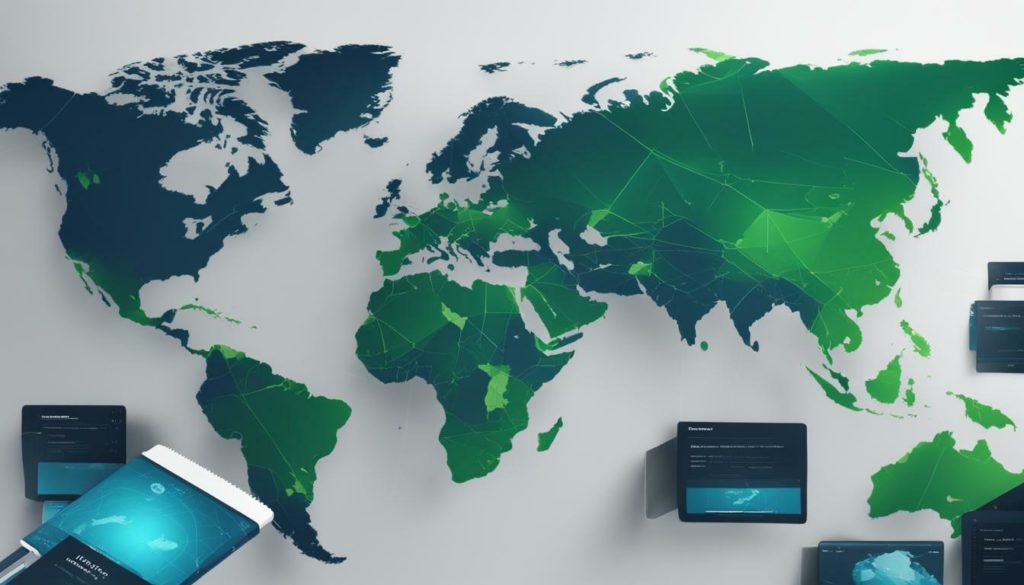
Comparison between VPNs and Proxies
| Feature | VPN | Proxy |
|---|---|---|
| Encryption | High | Low |
| Coverage | Wide range | Specific applications |
| Availability | Paid and free options | Mostly free |
| Logging policy | Often no-log | May log traffic |
Ultimately, the choice between a VPN and a proxy server depends on your specific needs and priorities. If you’re looking for enhanced privacy and security, a VPN is the recommended option. However, if you simply want to hide your IP address or access region-restricted content, a proxy server can serve your purpose. Whichever option you choose, it’s essential to prioritize your online security and take proactive measures to protect your personal information.
Conclusion
In conclusion, while a VPN and a proxy have similar functions, a VPN offers greater privacy, security, and coverage, making it the preferred choice for most individuals seeking online protection.
A VPN and a proxy server both serve the purpose of hiding your IP address and allowing you to browse the internet anonymously. However, there are key differences between the two that make a VPN a more comprehensive solution.
A proxy server acts as a relay between the website you’re visiting and your device. It only works with a single app or service, while a VPN secures all your internet traffic and encrypts it for extra security and privacy.
Furthermore, VPNs work on the operating system level, redirecting all of your traffic, while a proxy server is limited in its coverage. VPNs offer more extensive coverage and are usually paid services that often come with a no-log policy. On the other hand, many proxy servers are free and may monitor your traffic.
If your primary concern is to hide your IP address, both a VPN and a proxy server can achieve that. However, if you value greater privacy and security, along with a more comprehensive solution for all your internet traffic, a VPN is the recommended choice.
FAQ
Q: Is a VPN the same as a proxy?
A: No, a VPN and a proxy are similar in that they both hide your IP address, but they differ in their functionality and level of security.
Q: What is the difference between VPNs and proxies?
A: A proxy works with a single app or service, while a VPN secures all your internet traffic. VPNs encrypt your data, while proxies don’t. VPNs also offer more coverage and usually have a no-log policy, while many proxies are free and may monitor your traffic.
Q: How does a proxy server work?
A: A proxy server acts as a relay between the website you’re visiting and your device. It reroutes your internet traffic through a remote server, hiding your IP address and providing some level of anonymity.
Q: What are the basics of VPNs?
A: VPNs work on the operating system level and redirect all your internet traffic through a remote server. They encrypt your data, providing enhanced security and privacy for your online activities.
Q: Do VPNs offer better security than proxies?
A: Yes, VPNs offer stronger security than proxies. They encrypt your data, making it difficult for anyone to intercept or access your information. Proxies do not provide encryption.
Q: Are VPNs or proxies more widely available?
A: VPNs generally offer more coverage than proxies. There are various VPN services available, including both free and paid options, while proxies are often free but may have limitations in terms of coverage and features.
Q: Should I choose a paid or free VPN or proxy service?
A: The choice between paid and free services depends on your needs and priorities. Paid VPNs often offer better performance, more features, and stronger privacy protections. Free proxies may be suitable for basic browsing but may monitor your traffic and have limitations.
Q: Do VPNs and proxies provide privacy and anonymity?
A: Both VPNs and proxies can help enhance privacy and provide some level of anonymity. However, VPNs generally offer stronger protection and better privacy features, such as no-log policies and encryption.
Q: Do I need both a VPN and a proxy server?
A: No, you do not need both. VPNs fulfill the same function as proxies but provide greater privacy, security, and coverage. Using a VPN alone is sufficient for most users.
Q: Why is online security important?
A: Online security is essential to protect your personal information and data from unauthorized access or interception. VPNs and proxies play a crucial role in safeguarding your online activities and ensuring a safer browsing experience.
